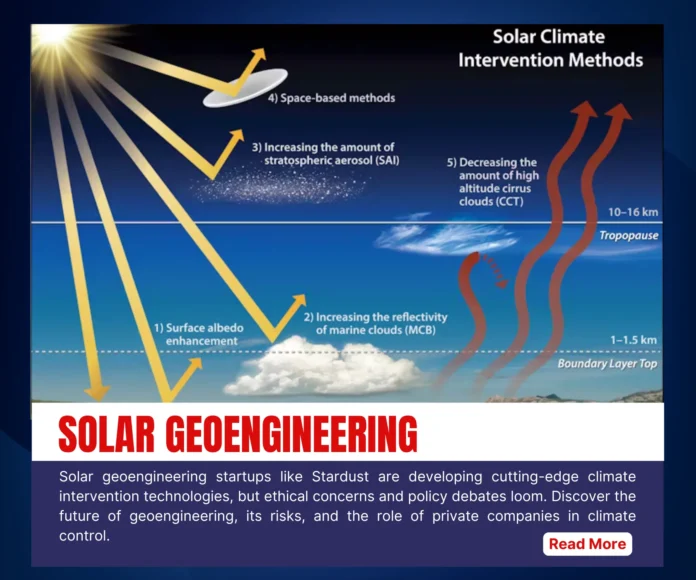The Rise of Solar Geoengineering Startups
As global temperatures continue to rise, discussions around climate intervention strategies have intensified. One emerging approach is solar geoengineering, a technology designed to reflect sunlight back into space to mitigate global warming. Among the private companies exploring this field, Stardust, a relatively secretive startup, has garnered attention for its efforts to patent and commercialize geoengineering solutions. While some view this as a potential breakthrough, others worry about the ethical and policy implications of such a development.
Solar geoengineering encompasses multiple techniques, including stratospheric aerosol injection and marine cloud brightening. These approaches are still under research, and their large-scale deployment remains controversial. The involvement of private startups like Stardust raises questions about governance, oversight, and accountability in this emerging field.
Stardust’s Strategic Position in Geoengineering
Stardust appears to be positioning itself as a key player in the future of geoengineering. The company’s business model suggests a focus on selling proprietary technology to governments. According to company representative Yedvab, Stardust operates under the premise that solar geoengineering will become a critical component of climate change mitigation in the coming decades. If international and U.S. governmental policies favor geoengineering, the value of Stardust’s technological portfolio could increase significantly.
The startup is currently in the process of patenting its geoengineering innovations. However, some experts warn that if governments choose not to pursue solar geoengineering, investors may face significant financial losses. This uncertainty underscores the risks involved in commercializing a field that is still in its early stages of policy and ethical consideration. Additionally, many experts argue that geoengineering should not be controlled by private entities, as it could lead to monopolization of climate interventions.
Stardust’s potential influence extends beyond patents and commercial strategies. The startup’s research and development efforts could set technological precedents that shape the global approach to solar geoengineering. If its proprietary technologies become the industry standard, Stardust could secure a significant role in international climate policies, further intensifying debates about corporate control over climate interventions.
Ethical and Governance Concerns
Despite its ambitious goals, Stardust has faced criticism regarding transparency and governance. Climate governance consultant Janos Pasztor has expressed concerns over the company’s lack of public engagement. He suggests that for Stardust to proceed ethically, it must operate with full transparency and independent oversight. “They are operating in a vacuum, in the sense that there is no social license to do what they are trying to do,” Pasztor stated.
Similarly, Shuchi Talati, founder of The Alliance for Just Deliberation on Solar Geoengineering, noted that Stardust has not adhered to key governance principles such as public consultation and information disclosure. The absence of transparency has raised fears that the company’s secretive approach could fuel conspiracy theories and erode public trust in the technology.

A lack of transparency in geoengineering development could have long-term consequences. Without proper public engagement and regulatory frameworks, the implementation of solar geoengineering could result in unintended environmental impacts, geopolitical tensions, and ethical dilemmas. Some experts argue that any attempts to deploy geoengineering technologies should involve international agreements to prevent unilateral actions that could have global repercussions.
The Debate Over Private Control of Geoengineering Technologies
Stardust’s approach has sparked a broader debate over whether geoengineering technologies should remain in private hands. Some experts argue that such critical climate intervention tools should be publicly owned to prevent monopolization. Pasztor has recommended that Stardust and its investors consider making their intellectual property freely available, similar to how Volvo released its seatbelt patent for public use.
Environmental advocacy groups, including Friends of the Earth, have expressed skepticism about privately funded geoengineering initiatives. Benjamin Day, a senior campaigner on geoengineering at the organization, has argued that venture capital-backed companies like Stardust may have an inherent bias in favor of deploying geoengineering solutions, even if the risks outweigh the benefits.
Day also warned that if governments rely on Stardust’s technology, they could become dependent on a single company for critical climate intervention tools. Since there is currently no private market for geoengineering solutions, Stardust’s profitability would likely hinge on government adoption. This could create a scenario in which governments feel pressured to use Stardust’s technology, even in the absence of long-term safety data or public approval.
The Future of Geoengineering and Its Global Implications
As governments deliberate on the role of geoengineering in climate change mitigation, companies like Stardust may find themselves at the center of regulatory and ethical debates. The global community must decide whether to embrace these emerging technologies, regulate them, or reject them altogether. If geoengineering becomes a widely accepted tool, ensuring ethical governance, public engagement, and fair access to technology will be paramount.
The future of solar geoengineering remains uncertain. While Stardust’s efforts may advance the field technologically, the lack of transparency and governance oversight raises important questions about the balance between innovation, ethics, and public trust. International regulatory bodies, research institutions, and policymakers will need to work together to establish frameworks that balance scientific progress with ethical responsibility.
Ultimately, the debate surrounding private startups in geoengineering reflects larger concerns about how humanity addresses climate change. Will interventions like solar geoengineering be used as a last resort to combat rising temperatures, or will they become a mainstream climate strategy? As research continues, ensuring that these technologies are developed responsibly, with broad global consensus, will be crucial in shaping the future of climate intervention.


